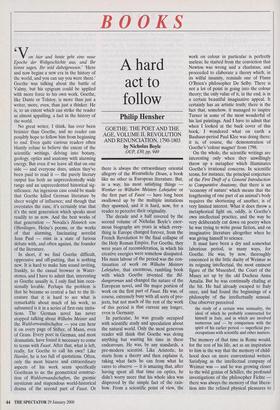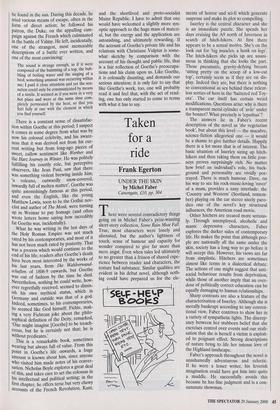BOOKS
A hard act to follow
Philip Hensher
GOETHE: THE POET AND THE AGE, VOLUME II, REVOLUTION AND RENUNCIATION, 1790-1803 by Nicholas Boyle OUP, 130, pp. 949 Von hier und heute geht eine neue Epoche der Weltgeschichte aus, und Ihr konnt sagen, Ihr seid dabeigewesen."Here and now begins a new era in the history of the world, and you can say you were there.' Goethe was talking about the battle of Valmy, but his epigram could be applied with more force to his own work. Goethe, like Dante or Tolstoy, is more than just a writer, more, even, than just a thinker. He is, to an extent which can strike the reader as almost appalling, a fact in the history of the world.
No great writer, I think, has ever been brainier than Goethe, and no reader can posObly hope to follow him from beginning to end. Even quite curious readers often bluntly refuse to believe the extent of the scientific writings, delving into botany, geology, optics and anatomy with alarming energy. But even if we leave all that on one side — and everyone does, unless they've been paid to read it — the purely literary output has both an unprecedentedly wide range and an unprecedented historical sig- nificance. An ingenious case could be made that Goethe killed German literature by sheer weight of influence; and though that overstates the case, it's certainly true that it's the next generation which speaks most readily to us now. And the best works of that generation — Novalis's Heinrich von Ofterdingen, Heine's poems, or the works of that alarming, fascinating novelist Jean Paul — exist in a state of furious debate with, and often against, the founder of the literature.
In short, if we find Goethe difficult, oppressive and off-putting, that is nothing new. It is hard to make him sound inviting, frankly, to the casual browser in Water- stones, and I have to admit that, interesting as Goethe usually is, I only find him occa- sionally lovable. Perhaps the problem is that he became so central a fact to the lit- erature that it is hard to see what is remarkable about much of his work, so subsumed is it in a series of first-rate imita- tions. The German novel has never stopped talking about Wilhelm Meister and the Wahlvetwandtschaften — you can hear it on every page of Stifter, of Mann, even of Grass. Every poet in German, and most dramatists, have found it necessary to come to terms with Faust. After that, what is left, really, for Goethe to call his own? Like Hamlet, he is too full of quotations. Often, only the most bizarre and extraordinary aspects of his work seem specifically Goethean to us: the geometrical construc- tion of Wahlvenvandschaften, the gnomic mysticism and stupendous world-historical drama of the second part of Faust. Or there is always the extraordinary oriental allegory of the Westostliche Divan, a book like no other in European literature. But, in a way, his most satisfying things — Werther or Wilhelm Meisters Lehtjahre or the first part of Faust — have long been swallowed up by the multiple imitations they spawned, and it is hard, now, for a reader to perceive their originality.
The decade and a half covered by the second volume of Nicholas Boyle's enor- mous biography are years in which every- thing in Europe changed forever, from the French Revolution to the final collapse of the Holy Roman Empire. For Goethe, they were years of reconsideration, in which his creative energies were somehow dissipated. His main labour of the period was the con- tinuation of work on Wilhelm Meisters Lehrjahre, that enormous, rambling book with which Goethe invented the Bil- dungsroman and changed the nature of the European novel, and the major portion of work on the first part of Faust. He was, of course, extremely busy with all sorts of pro- jects, but not much of the rest of the work of this period is that current any longer, even in Germany.
In particular, he was greatly occupied with scientific study and speculation about the natural world. Only the most generous reader will think that Goethe was doing anything but wasting his time in these endeavours. He was, by any standards, a pre-modern scientist. Like Aristotle, he starts from a theory and then explains it, taking what facts he can from what he cares to observe — it is amazing that, after having spent all that time on optics, he didn't worry more that his whole idea was disproved by the simple fact of the rain- bow. From a scientific point of view, the work on colour in particular is perfectly useless; he started from the conviction that Newton was wrong and a charlatan, and proceeded to elaborate a theory which, in its wilful insanity, reminds one of Flann O'Brien's philosopher De Selby. There is not a lot of point in going into the colour theory; the only value of it, in the end, is in a certain beautiful imaginative appeal. It certainly has an artistic truth; there is the fact that, somehow, it managed to inspire Turner in some of the most wonderful of his last paintings. And I have to admit that when I looked at the back cover of this book, I wondered what on earth a Bauhaus-period Paul Klee was doing there; it is, of course, the demonstration of Goethe's 'colour magnet' from 1798.
On the whole, the scientific writings are interesting only when they unwillingly throw up a metaphor which illuminates Goethe's irrational concerns. In scientific terms, for instance, the principal conjecture of the First Draft of a General Introduction to Comparative Anatomy, that there is an 'economy of nature' which means that the lengthening of one part of an animal's body requires the shortening of another, is of very limited interest. What it does throw a metaphorical light on, oddly, is Goethe's own intellectual practice, and the way he very deliberately cut down on poetry when he was trying to write prose fiction, and on imaginative literature altogether when he was giving himself to science.
It must have been a dry and somewhat laborious period, in many ways, for Goethe. He was, by now, thoroughly ensconced in the little duchy of Weimar as its reigning intellectual, the most eminent figure of the Musenhof, the Court of the Muses set up by the old Duchess Anna Arnalia. But he was continually chafing at the bit. He had already escaped to Italy once, and had found the beginnings of a philosophy of the intellectually sensual. One observer perceived
the study of a certain wise sensuality, the ideal of which he probably constructed for himself in Italy, and in which are involved numerous and — by comparison with the spirit of his earlier period — superficial pre- occupations with scientific and other matters.
The memory of that time in Rome would, for the rest of his life, act as an inspiration to him in the way that the memory of child- hood does on more conventional writers. Satisfying as the intellectual company of Weimar was — and he was growing closer to the wild genius of Schiller, the profound investigations of the philosopher Fichte — there was always the memory of that libera- tion into the refined physical pleasures to be found in the sun. During this decade, he tried various means of escape, often in the form of direct action; he followed his patron, the Duke, on the appalling cam- paign against the French which culminated in the battle of Valmy. He left, incidentally, one of the strangest, most memorable descriptions of a battle ever written, and one of the most convincing: The sound is strange enough, as if it were composed of the humming of a top, the bub- bling of boiling water and the singing of a bird; something unusual was occurring within me; I paid it close attention and yet the sen- sation could only be communicated by means of a simile. It seemed as if you were in a very hot place and were at the same time com- pletely permeated by the heat, so that you feel fully at one with the element in which you find yourself.
There is a constant sense of dissatisfac- tion within Goethe at this period; I suspect it comes in some degree from what was by now his colossal celebrity, and his aware- ness that it was derived not from his cur- rent writing but from long-ago pieces of sweet, callow sentiment like Werther and the Harz Journey in Winter. He was politely fulfilling his courtly role, but perceptive observers, like Jean Paul, saw that there was something violent brewing inside him; .a volcano, outwardly snow-covered, Inwardly full of molten matter'. Goethe was quite astonishingly famous at this period, and even the English, like the young Matthew Lewis, soon to be the Gothic nov- elist and author of The Monk, were turning Up in Weimar to pay homage (and often wrote letters home saying how incredibly fat Goethe was, incidentally). What he was writing in the last days of the Holy Roman Empire was not much rated by his contemporaries, and most of it has not been much rated by posterity. That was a process which would continue to the end of his life; readers after Goethe's death have been most interested by the works of his last years, from Die Wahlverwand- schaften of 1808-9 onwards, but Goethe was out of fashion by the time he died. Nevertheless, nothing he could write, how- ever regretfully received, seemed to dimin- ish his own mythical status, which in Germany and outside was that of a god. Indeed, sometimes, to his contemporaries, he seemed like God himself; Fichte, mak- ing a very Fichtean joke about the philo- sophical definition of the Deity, remarked, One might imagine [Goethe] to be treach- erous, but he is certainly not that; he is Without predicates.' This is a remarkable book, sometimes wearing but always full of value. From this Point in Goethe's life onwards, a huge amount is known about him, since anyone Who visited him made notes of his conver- sation. Nicholas Boyle explores a great deal Of this, and takes care to set the colossus in his intellectual and political setting; in the first chapter, he offers terse but very chewy accounts of the French Revolution, Kant, and the shortlived and proto-socialist Mainz Republic. I have to admit that one would have welcomed a slightly more syn- optic approach to the huge mass of materi- al, but the energy and the application are astonishing, and ultimately rewarding. If the account of Goethe's private life and his relations with Christiane Vulpius is some- what sketchy by comparison with the account of his thought and public life, that is a fair reflection of Goethe's preoccupa- tions and his claim upon us. Like Goethe, it is colossally daunting, and demands our serious attention; it is only fair to say that like Goethe's work, too, one will probably read it and feel that, with the act of read- ing, one has only started to come to terms with what it has to say.



















































































 Previous page
Previous page